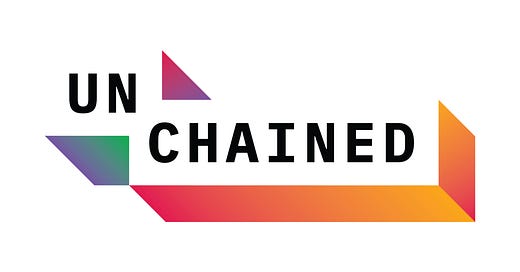The SEC Wants This Type of ETF 🤑
Weekly News Recap: 📈 Ledger's security breach, 💰 FASB revamps crypto accounting, 🏛️ FTX vs IRS in tax showdown, 💼 KuCoin's $22M settlement, and more!
You are reading the Unchained Weekly newsletter, where we cover all the major news in the crypto space, providing insights into the market's latest trends, regulatory shifts, and technological advancements. Stay informed. Your no-hype resource.
In this episode of Unchained, James Seyffart from Bloomberg Intelligence unravels the complexities surrounding the anticipated launch of a spot bitcoin ETF.
Seyffart discusses the ongoing debate between cash and in-kind creations and redemptions for these ETFs, a topic of considerable importance in the near future. He also examines the likely impact this decision could have on major entities like Grayscale and BlackRock.
Highlighting a notable shift in regulatory attitudes, Seyffart noted: "My view is that the SEC has pretty much implicitly accepted Ethereum as a commodity at this point."
Listen to the episode on Apple Podcasts, Spotify, Overcast, Podcast Addict, Pocket Casts, Pandora, Castbox, Google Podcasts, Amazon Music, or on your favorite podcast platform. Or watch it on YouTube.
Take Our Annual Survey 🙏
📢 Calling all Unchained fans! Take the Unchained annual survey and share your thoughts on how we can improve. 🚀
Participate for a chance to win exclusive Unchained merch! 🎁
Weekly News Recap
Ledger Connect Kit Compromise Leads to Major Security Breach
On Thursday morning, the crypto industry was rattled by a significant security incident with the compromise of Ledger's Connect Kit. Hackers injected malicious code into the GitHub library of Ledger’s Connect Kit, a key component used for connecting decentralized applications, or dApps, to crypto hardware wallets. This breach affected the front-end of multiple dApps, leading to the unauthorized draining of $504,000 from users' wallets by the time of this recording. The exploit caused wider panic and confusion because it was not limited to Ledger wallet users. Ledger's Connect Kit is used by giants in the space such as SushiSwap, Lido, Metamask, and Coinbase.
Ledger responded promptly by replacing the compromised version with a genuine one, and advised users to carefully verify transaction details. Despite the quick response, the potential extent of the breach was significant, with several dApps and crypto protocols urging users to refrain from interacting with them until the situation was clarified.

At 1:45 EST on Thursday, the Ledger team confirmed on X that the situation was solved. They wrote: “Ledger and WalletConnect can confirm that the malicious code was deactivated. You are now safe to use your Ledger Connect Kit.”
FASB's New Crypto Accounting Rules Pave Way for Enhanced Financial Transparency
This week, the Financial Accounting Standards Board (FASB) introduced new rules, potentially solving a big pain point for companies accounting for digital assets like Bitcoin on their balance sheet. These amendments, which become effective after December 15, 2024, will enable companies to reflect the fair market value of their crypto holdings in their financial statements. Previously, firms were required to record losses when digital asset values fell below purchase prices, but could not report gains when values rose, unless the assets were sold.
Joe DiPasquale, CEO of BitBull Capital, praised the update. He told Unchained that the changes would make it “much easier for us to view the actual value of companies’ crypto holdings.”

Michael Saylor, Chair of MicroStrategy, a significant Bitcoin investor, also applauded the FASB’s new guidance. He wrote on X, “This upgrade to accounting standards will facilitate the adoption of Bitcoin as a treasury reserve asset by corporations worldwide.”
FTX Clashes With IRS Over $24 Billion Tax Claim
On Tuesday, lawyers for the beleaguered crypto exchange FTX objected to a staggering $24 billion tax claim from the Internal Revenue Service (IRS). Initially, the IRS had demanded as much as $43 billion, but this figure was later adjusted to $24 billion, a sum FTX has still branded as "absurd and meritless."
The FTX bankruptcy estate argues that the exchange, which only operated for about three years, never generated income close to the amount claimed by the IRS. Indeed, audit firm Ernst & Young calculated that FTX recorded over $11 billion in losses from 2020 to 2022.

FTX's legal team is challenging the IRS to justify its calculations, stating that the tax claims significantly exceed any income the exchange could have possibly earned. This development comes as FTX reported recovering $7.3 billion in assets earlier this year, with a plan to refund 90% of creditors’ claims if its amended bankruptcy plan is approved by mid-2024. However, the IRS's demands could greatly impact these efforts, potentially delaying the recovery of user funds.
KuCoin Settles for $22 Million With New York AG
KuCoin, a well-known digital asset exchange, has agreed to a significant settlement with the New York Attorney General's office. The exchange will pay $22 million in fines and refunds, as well as cease operating in New York State, in order to settle allegations of operating as an unregistered securities trading platform. This amount includes a $5.3 million fine and over $16.7 million in refunds to New York users. The settlement resolves claims that KuCoin acted as an unregistered securities and commodities broker-dealer in the state.
The lawsuit, filed in March 2023 by Attorney General Letitia James, is part of her intensified efforts to regulate the crypto industry. The Martin Act, a New York law aimed at protecting consumers from securities fraud, was cited in the lawsuit against KuCoin. This settlement comes amid a challenging time for digital asset exchanges, following Binance's recent $4.3 billion penalty for violating sanctions laws and operating without a license.
KuCoin's CEO assured users of their asset security during the transition, indicating those affected would be notified via email or SMS. Interestingly, despite the legal challenges, KuCoin's native token, KCS, has shown a significant increase in value recently, reflecting a broader surge in the crypto markets.
Binance Stands Firm Against SEC Lawsuit
Binance intensified its legal defense against a lawsuit by the U.S. Securities and Exchange Commission (SEC). Despite recently settling with the U.S. Department of Justice (DOJ), Binance and its former CEO, Changpeng Zhao, face ongoing litigation with the SEC.
The SEC's lawsuit alleges that Binance violated U.S. securities laws by failing to register as a broker-dealer, and cites the sale of BNB tokens and BUSD stablecoins as examples of unauthorized securities transactions. Binance's legal team has disputed these allegations, challenging the SEC's arguments and questioning the relevance of the DOJ settlement, in which Binance pleaded guilty to money laundering and other criminal violations, to the current case. Meanwhile, Binance's blockchain, BNB Chain, reported a record-high 32.7 million transactions, demonstrating robust activity despite the legal challenges.

Bitcoin ETFs: BlackRock and YieldMax Propose Innovative Models
Once again, developments in Bitcoin ETFs took center stage this week.
Some additional details not explored in the interview with James are that BlackRock revised its Bitcoin ETF filing, introducing an innovative "in-kind redemption prepay" model. This adjustment allows major U.S. banks to act as authorized participants, bypassing restrictions on banks holding crypto directly on their balance sheets. The model enables banks to exchange cash for Bitcoin through an intermediary, with Coinbase Custody serving as the ETF custody provider. BlackRock's move addresses SEC concerns about market manipulation and execution risks, shifting them from investors to crypto market makers.
Meanwhile, YieldMax applied with the SEC to start an ETF focused on MicroStrategy (MSTR), the largest corporate holder of Bitcoin. This fund aims to generate monthly income by trading MSTR derivatives and earning interest on U.S. Treasury security holdings. Bloomberg Senior ETF analyst Eric Balchunas, however, expressed skepticism about this ETF, suggesting that investors bullish on MicroStrategy might be better off just buying the stock directly.

Also, SEC chair Gary Gensler told CNBC on Thursday that the agency’s “new look” at applications for a spot bitcoin ETF was influenced by recent court rulings. One of those was an August decision by the U.S. Court of Appeals for the D.C. Circuit ruling in favor of Grayscale’s arguments against the SEC for denying a bid to convert its Grayscale Bitcoin Trust into a spot ETF. "We had in the past denied a number of these applications, but the courts here in the District of Columbia weighed in on that," Gensler said on CNBC. "So we're taking a new look at this based upon those court rulings."
Three Arrows Capital's Su Zhu Faces Singapore Court in Asset Recovery Efforts
On Wednesday, Bloomberg reported that Su Zhu, co-founder of the now-defunct Three Arrows Capital (3AC), faced a Singapore court for questioning for the first time about the fund's collapse. The interrogation, conducted by Teneo, the appointed liquidator, focused on understanding the failure of 3AC and tracing its assets. Zhu's arrest in September marked a crucial step in addressing creditors' concerns, with liquidators aiming to recover $3.3 billion. Despite Zhu's past claims of cooperating in good faith, the liquidators have struggled to recover significant assets, reflecting the broader challenges following the dramatic collapse of 3AC.
Montenegro High Court Extends Detention of Do Kwon
Montenegro's High Court has extended the detention of Terraform Labs co-founder Do Kwon, as reported by Bloomberg. Following requests from the US and South Korea, the court ruled to extend Kwon's custody until February 15. Both countries are pursuing charges against Kwon related to the 2022 collapse of the algorithmic stablecoin TerraUSD and its entire ecosystem. A decision on Kwon's extradition is pending, with Montenegro's justice minister to determine his fate.





